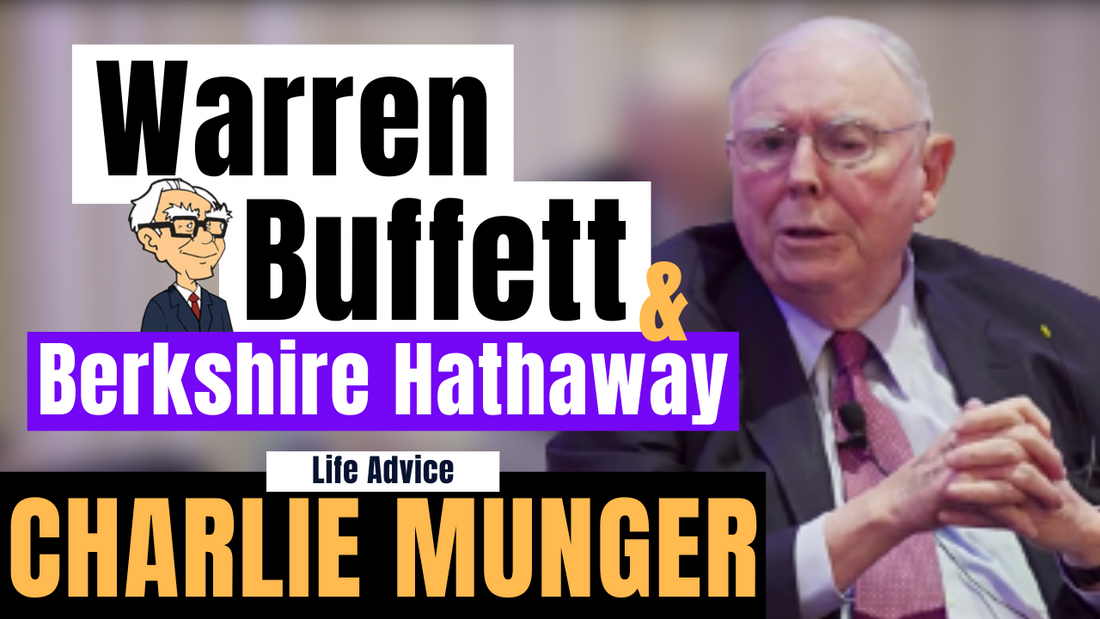
How Warren Buffett Invest & The Main Secret of Berkshire - Charlie Munger | M.Ross 2017【Ep.226】
[Transcript]
SCOTT DERUE: And so, at what point did you meet Warren? And –
CHARLIE MUNGER: 1959. (Laughter)
SCOTT DERUE: And so where did Berkshire Hathaway come from regarding this partnership that you all have now had for decades?
CHARLIE MUNGER: Well, Warren had been taught by Ben Graham to buy things for less than they were worth no matter how lousy the business was.
And you can't imagine a more lousy business than New England textile mills. Because textile is a congealed electricity, and the electricity rates in New England were about 60% higher than TVA rates. So it was absolute, inevitable, certain liquidation.
Now, Warren should have known better than to buy into a totally doomed enterprise, but it was so damn cheap. We could buy it at a big discount from liquidating value. So he bought a big chunk, and finally ended up controlling the business.
But the business was going to die, so the only way to go forward from there was to wring enough money out of this declining textile business, and to have more money than he paid to get in, and use it to buy something else.
That's a very indirect way to proceed, and I would not recommend it to any of you. Just because we did some dumb thing that worked, you have to repeat our path. And of course, we eventually learned not to buy these cigar butts when they were cheap and do these painful liquidations. And so we stood by better businesses. That's the main secret of Berkshire.
The reason that Berkshire has been successful as a big conglomerate – more successful than any other big conglomerate so far as I know, any other big conglomerate in the world. The reason it's been successful is we try and buy things that aren't going to require much managerial talent at headquarters.
Everybody else thinks they've got a lot of managerial talent at headquarters, and that's a lot of hubris. If the business is lousy enough and it gets a wonderful manager, and the business has a lousy reputation and the manager has a good reputation, it's the reputation of the business that's going to remain intact.
You can't fix these really lousy businesses. You can wring the money out whatever comes in liquidation and do something else with it, but most lousy businesses can't be fixed.
SCOTT DERUE: But at the time Warren was – that's what he was doing – and so –
CHARLIE MUNGER: Yes.
SCOTT DERUE: – How did you convince him?
CHARLIE MUNGER: I helped him. He bought a windmill company – (Laughter) – in a little town in Nebraska. And Warren didn't know anything about running a windmill company. He bought it because it was cheap.
He said to me what do you do, why can't you fix my windmill company, who can you get to help me? I said I've got just the man for you. And so one of my old colleagues from a transformer business who was an accountant – I said he will fix your windmill company. And Warren was desperate, he just hired him on the spot.
And Harry walked in the first day in this little town which had this big collection of windmills and so forth. And a whistle blew, and the whole plant stopped for 15 minutes. (Harry asked) what the hell is this?
They said well, it's respect for the town every time it has a funeral, we blow this whistle and stop for 15 minutes. Harry said that'll be the last time, and he just approached everything that way, and of course another thing he did is he cut away all of the fat that he didn't need. And then he found there were certain parts where we're the sole supplier, and he raised all the prices of those parts. You can see what a business genius we are. (Laughter)
SCOTT DERUE: So, how did you convince Warren to stop buying the bad apples and start buying the good apples?
CHARLIE MUNGER: Warren gave me credit, but he was going to learn it any way. He just made so much money in this other stuff and he'd been taught it by Ben Graham. It was hard for him to quit when he was just coining money.
But he saw the point, and you couldn't scale that business. And it was kind of scroungy and unpleasant when you're firing people, who in the hell wants to do that. So we just run the money out and bought better businesses, and we've been doing it ever since.
Coming to business – not as business school graduates – but as people who had owned portfolios of securities: we thought like capitalists, because we were always in the shareholder mindset.
A lot of people running the businesses think like careerists. Believe me, you got to think like a careerists to some extent if you're in a career, but it also helps to look at the business strategy problems as though you're an owner.
And so my advice to you is you don't want to be – never get to be a careerist so much that you don't see it from the owners point of view.
That's what General Motors did. They had a bunch of careerists, and an owner would have seen immediately that situation was hopeless. And they just romped through it with a lot of denials and stupidity and pomposity, and of course they went bankrupt. The mightiest company in the world went bankrupt. And none of those hotshot executives thought like an owner, or they would have seen that it was hopeless.
SCOTT DERUE: So Charlie, one of the things I've always been fascinated about –
CHARLIE MUNGER: It was hopeless the way they were handling it.
SCOTT DERUE: Well, with Berkshire, in the way that you all manage both headquarters and the businesses that you own, you are putting talent in place who think like shareholders, not careerists, so how do you when you're buying a business, or bringing talent into an existing business, how do you evaluate talent to see are they going to think more like a shareholder or as a careerist?
CHARLIE MUNGER: Private equity frequently buy a business where the founder is going to leave then they go out and hire talent to run it. That is a tough way to make a buck, and I don't like it. We generally buy with the talent in place.
Now, maybe there's some guy in the number two place and we put him in the number one place. But we very seldom, I can't think of any place where we bought something and put somebody in after Harry Bottle (who ran Dempster Mills), and no we don't do that. And it's amazing how long we have some of those people stay.
Warren always says we can't teach the new dogs the old tricks.
SCOTT DERUE: What's the implication of not being able to teach the old dogs new tricks, or new tricks to old dogs? When if we look at what's happening in business today, what we see is executive –
CHARLIE MUNGER: We can’t teach the old tricks to the young dogs, that's what we found. So we keep the old dog in place. (Laughter)
SCOTT DERUE: But that's not the norm right? I mean if we look around –
CHARLIE MUNGER: No, it’s a norm in life. It may not be – our practices may not be the norm, but normally it's very hard to get the – you got a wise old dog, getting a young dog that could match him. That's hard. By definition, he's survived a big culling process. And he's unique, and he's got a record to prove it.
And by the way, everybody thinks you can judge people by an interview – and of course you know who you like, and you know you don't like – but everybody overestimates how much you can tell in prediction by meeting somebody. We all like to think that we have that capacity, but it's a vastly stupid type of overconfidence. The paper record has about three times the predictive value than your impression in an interview.
And of course we're buying great paper records. It's so simple.
SCOTT DERUE: But it's fascinating to me if we look around business, generally, the movement of people across firms, and there's always new dogs. And you've taken a contrarian position to that and managed Berkshire differently.
CHARLIE MUNGER: Oh, it doesn't like work, of course, we're still hiring young dogs and into these businesses, but it's amazing how much of the record of Berkshire has come from the old dogs who are in the business when we buy them. You can't believe how good those people have been.
There's one huge exception in the new dog department. I almost despise the business of executive search, because I find that they really want to sell you the best that's available even if they're no damn good, and I don't like that.
But the best single expense that Berkshire ever had was when we paid an executive recruiting firm to find us Ajit Jain to come into our little tiny insurance operation.
He didn't have any experience in insurance at all. He was an honors graduate of the main technical institute in India – he was a very smart man. But he came in and created our whole reinsurance business – it's the only big business we created from scratch, and Ajit did the whole damn thing. Of course, he talked with Warren every night and so it was like father and son.
Man, this is a very Confucian company, but that was unbelievable. So we hired an executive recruiter who brings us an Indian with no experience at all in insurance, and he talks with an old man every night, and it's now by far the biggest reinsurance business in the world. That's been a gold mine.
There's at least 60 billion dollars in Berkshire of net worth that Ajit has created, that we would not have created without him.
SCOTT DERUE: Wow.
CHARLIE MUNGER: And the value is way more than 60 billion. I mean there's that much in extra just liquid net worth, but the value of the business is way more than 60 billion.
(Source: https://youtu.be/S9HgIGzOENA)
[YAPSS Takeaway]
1. It's far better to buy good businesses than cigar butt.
-
"If the business is lousy enough and it gets a wonderful manager, and the business has a lousy reputation and the manager has a good reputation, it's the reputation of the business that's going to remain intact." ~Charlie Munger
2. You got to have the owner mindset to see things differently.
-
"A lot of people running the businesses think like careerists. Believe me, you got to think like a careerists to some extent if you're in a career, but it also helps to look at the business strategy problems as though you're an owner. And so my advice to you is you don't want to be – never get to be a careerist so much that you don't see it from the owners point of view." ~Charlie Munger
3. You can't judge a person just by an interview, you got to look at his records.
-
"Everybody thinks you can judge people by an interview – and of course you know who you like, and you know you don't like – but everybody overestimates how much you can tell in prediction by meeting somebody. We all like to think that we have that capacity, but it's a vastly stupid type of overconfidence. The paper record has about three times the predictive value than your impression in an interview." ~Charlie Munger
